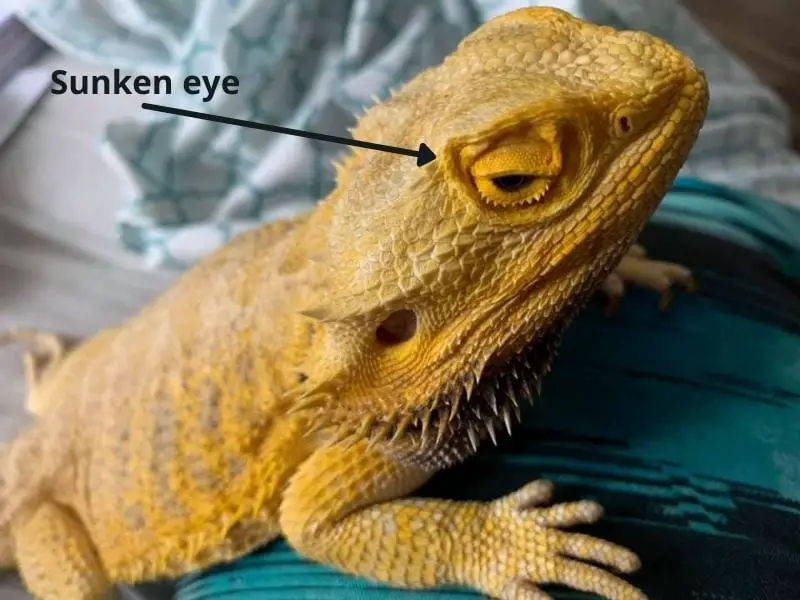Sunken eyes in bearded dragons are a sign that something is wrong with their health. A healthy bearded dragon will always be vibrant with bright coloring around the eyes. In most cases, sunken eyes are an indicator of illness – will be accompanied by other unpleasant signs.
Ensure the reptile is checked by a veterinarian as soon as possible to discover the problem and prevent heightened risk.
Reasons for Sunken Eyes in Bearded Dragons

There are many reasons for sunken eyes in lizards. When you discover this problem, the first thing you want to suspect is an illness, which is true in most cases. However, many other reasons that can make the eyes of your bearded dragon appear unhealthy.
Here are the reasons for sunken eyes in bearded dragons:
1. Dehydration
When bearded dragons are not getting enough water, dehydration can be a severe risk. Therefore ensure your pet has access to clean and fresh drinking water at all times.
If dehydration is the cause of sunken eyes in bearded dragons, there will also be other signs that accompany it, such as dry mouth, excessive drooling, or lethargy.
In most cases of dehydration, the animal will have sunken eyes with bloodshot whites and dull skin coloration around them. As dehydration sets in, give fluids by dropping food soaked in water into their mouths or using an eyedropper to place drops on their tongue.
Extreme dehydration in lizards can cause serious discomfort and can even kill the pet if not treated soon enough.
READ ALSO: Bearded dragon blood in stool: Causes and Remedies
2. Extreme heat
Extreme heat is a major cause of sunken eyes in bearded dragons. When exposed to extreme temperatures, the reptile will suffer from dehydration and other health problems associated with this condition.
Exposure to excessive heat in the environment can happen if they live in a warm place, such as inside of an enclosed space without ventilation or on concrete flooring with no protective covering (such as a tarp).
If your beard dragon has sunken eyes there will also be signs of extreme restlessness or lethargy, drooling more than usual, breathing with difficulty, or heavy panting accompanied by red skin coloration around the face and throat region.
When exposed to extreme heat, the lizards might show flattened scales on their bodies and distinctive behaviors like moving around in search of shade or cooler areas.
If there is a problem with the vivarium’s high temperature, you should turn off the heating mat in the tank as soon as possible. Next, check to ensure the cooling area is cool and the lizard can access it. Ideally, remove the reptile from the tank and provide enough water to fix the sunken eyes as soon as possible.
3. Illness
Illness is one of the leading causes of sunken eyes in bearded dragons. Depending on what illness, there will be other signs such as a change in sleeping pattern (excessively sleepy or awake during nighttime), weight loss, refusal to eat, lethargy, and drooling more than usual.
If you suspect illness to be the cause of your dragon’s sunken eyes take him/her to a veterinarian right away because some diseases are curable while others may progress too fast. Bearded dragons that show any sign of illness should be isolated as soon as possible from other pets.
Extremely sunken eyes in bearded dragons can also mean the bearded dragon’s illness is advanced and should be treated as soon as possible.
Common illnesses in bearded dragons include respiratory, gastric, and kidney illnesses.
4. Parasites
Parasites can cause a lot of discomfort in bearded dragons. When they bite around the eyes, they can easily lead to sunken eyes. When parasites infect the pet’s body, the symptoms will depend on which one it is, but there may also be other signs such as weight loss or refusal to eat.
If your dragon has an eye infection because of parasites, take him/her to see a veterinarian right away for treatment.
The most common type of parasite in lizards is roundworms, followed by tapeworms. However, the worst parasites are external ones. These are more likely to cause sunken eyes because they bite the area around the eyes, causing discomfort and infections.
If your bearded dragon closes one eye constantly that appears sunken, check for parasites like fleas, mites, and small ticks. It’s important to remember that parasites can be easily transmitted from one pet to another, so ensure your bearded dragon doesn’t have any contact with other animals while he/she has a parasite infection.
READ ALSO: 9 Reasons Why a Bearded Dragon is Waving: What It Means
5. Loss of weight
Loss of weight is a sign that the bearded dragon’s body isn’t functioning properly. When weight loss occurs, it can affect all parts of their life, including behavior and appetite.
Extreme weight loss may indicate that the reptile has lost most of its muscle mass, making the eyes sink deep into the eye sockets. You will notice many signs of an underweight bearded dragon, including diminished fat pads, lethargy, protruding rib cage, and other undesirable signs.
If your bearded dragon’s eyes are sunken, you must address the issue of weight. If your pet has lost weight or refuses to eat because they’re ill, take them to the vet as soon as possible.
You can also fix weight problems by providing enough fatty foods more frequently, such as hornworms, waxworms, and superworms.
6. Low humidity
All reptiles depend on high humidity levels to survive. In low-humidity environments, bearded dragons are more likely to have sunken eyes and other signs of dehydration because of the lack of moisture in their humid skin folds and scales.
It’s not uncommon for low-humid environments such as deserts or cold climates to cause low eye pressure (which is a major factor when it comes to eye health) so reptile owners should make sure they’re providing enough heat sources as well as appropriate humidity levels at all times.
- Mist the reptile and its enclosure lightly to improve humidity levels
- Maintain humidity levels between 20-40%
- Keep the enclosure’s temperature at 75-85°F
High temperatures can easily cause water loss in the environment, leading to dry, sunken eyes and skin.
READ ALSO: Coccidia in Bearded Dragons – Signs, Causes, Treatment
How to Fix Sunken Eyes and Lethargy in Bearded Dragons
Sunken eyes are a severe symptom that may indicate the pet lizard is near death if mitigation is not done as soon as possible. You want to make sure you treat the reptile as soon as possible to reduce the risk of death.
Here’s how to fix sunken eyes in bearded dragons:
1. Provide water
If the reason for the sunken eyes is desiccation, provide adequate water for the beardie to drink. Simply place a bowl or two of drinking water in the enclosure to ensure that the pet drinks whenever necessary.
- You can also provide more liquid by lightly misting the reptile and its enclosure.
- Maintain humidity levels between 20-40%
If rehydrating the lizard does not help rid of the sunken eyes, I would recommend taking it to a vet for a check-up and proper treatment.
2. Feed them with greens
Vegetables contain a high amount of water. Therefore, green vegetables like arugula, cilantro, mustard greens, and broccoli can help in providing the lizard with fluid. Include some of these green vegetables in your bearded dragon’s diet regularly to ensure they get enough liquids and stay healthy.
Bonus tip: Because cacti contain a lot of water, they’re another good option if your pet doesn’t like green vegetables.
3. Treat illnesses
If the bearded dragon has sunken eyes but is drinking and eating normally, it could be due to an illness. Sunken eyes can be a symptom of some infection that needs special attention to treat.
In this case, the best course of action is to have the pet treated by a qualified veterinarian. Do not diagnose or treat the pet at home. Sunken eyes are an extreme symptom and can mean the pet lizard is near death if mitigation is not done as soon as possible.
4. Correct humidity and temperature
If the humidity is too low, it can lead to dehydration and sunken eyes. And if the temperature is very hot, this could also cause problems with your pet lizard’s health.
You should make sure that there are some water droplets on plants in their enclosure so they will have a continuous source of moisture regardless of the climate or location where you live.
In case of severe heat, ensure that you treat them by placing them under a cool running tap for at least 45 seconds before making any other changes to their environment. You want to provide increased ventilation when temperatures exceed 30 degrees Celsius.
5. Fatten up the beardie
A skinny bearded dragon won’t be pleasant to look at, so you want to ensure you provide adequate nutrition to prevent the eyes from sinking into the sockets due to weight loss.
Provide enough food, such as hornworms, waxworms, or superworms so they have fatty foods in their diet instead of protein sources that are not high in fat content.
Also, reduce the stress levels in the enclosure to make sure the reptile eats as much as needed – such as competition for food, extremely low temperatures, and lack of a heating pad.
READ NEXT: Bearded Dragon Sleeping in the Corner – Reasons + What to Do

